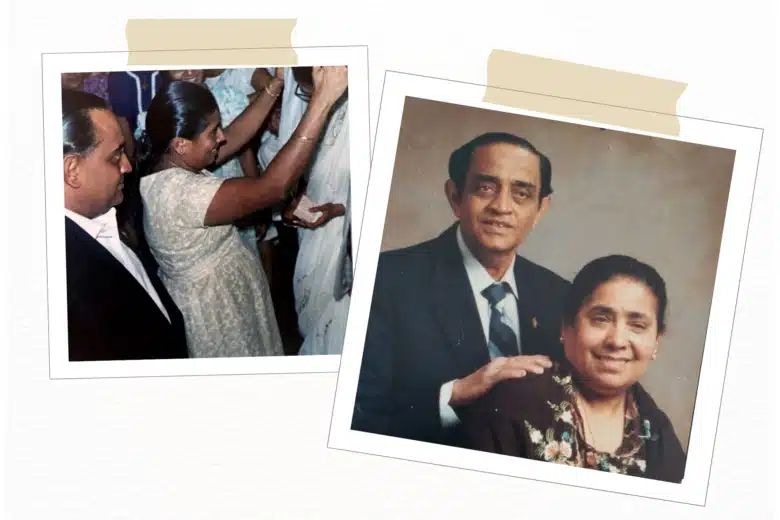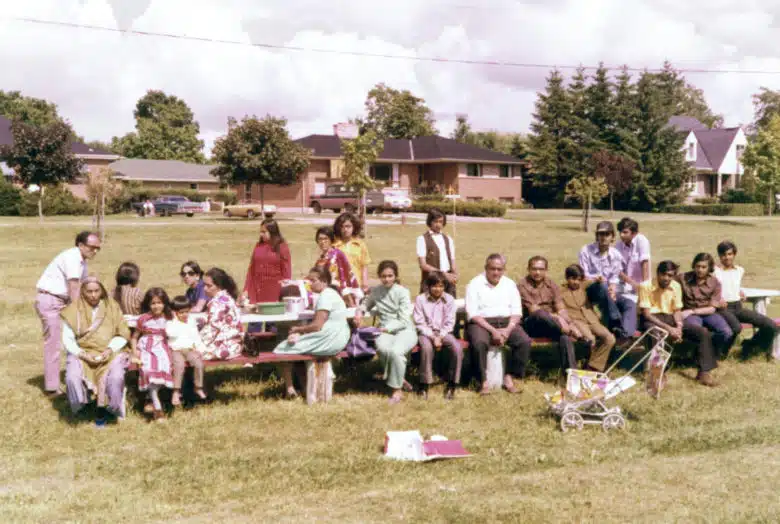‘This is not our home anymore’: The inter-generational impacts of grief, loss and the courage to move forward
By Shairoze Walji
Birthday celebrations outside Walji-Adatia family home in Jinja, Uganda. © Photo courtesy the Walji-Adatia family
“This is not our home anymore.”
That was what my aunt remembers my grandfather, my Dada, saying the day he decided it was time for my family to leave Uganda. The place he was born and raised — along with his four children.
What had it taken? For the country he desperately loved to no longer feel like home? Only a few weeks before, he was determined to stay.
When I learned that Dada refused to leave Uganda, I was shocked.

Left: Rajabali (Dada) and Khatija (Dadima) Walji-Adatia celebrating my grandfather’s brother’s wedding, in Kampala Uganda. Right: Khatija and Rajabali Walji-Adatia. © Photo courtesy the Walji-Adatia family
He was always by the books. In Canada, I remember him voting in every election, wearing his Canadian flag with pride and even coming with me to political rallies I was fiercely passionate about.
But one thing he could not accept was being told to leave his birth country. The place he recounts his childhood and the memories he made along the way. He refused.
It wasn’t until the army came, took him away, and beat him that he changed his mind. Learning about this left a deep pain in my heart that I still cannot describe in words today. I had only found out after he had passed away, and family stories started to come out.
I began to learn more about my family’s journey to Canada from Uganda after the expulsion of all South Asians in 1972. I had always known that my family came to Canada as refugees, but I never knew the details or their struggles. They repressed their trauma under lock and key or chose to forgive and forget.

Picnic with reunited family in Guelph. © Photo courtesy the Walji-Adatia family
Dada was my person. We used to ride the city bus in Guelph together in search of our next pastry to enjoy. He was a happy man who loved to laugh. We lived above our family’s convenience store — my Dada, my Dadima or Maji (grandmother), my dad, my mom, my sister and I. Think Kim’s Convenience, but in real life.
My Dada was the eldest son in his family, so our home was the gathering spot for any visitors. I fondly remember my extended family coming over for dinner often.
My mom and Dadima would often cook a traditional East African Indian dish — with aromas of cloves, cumin, cardamom and onions filling the air. The adults sat together at the dining room table, telling jokes, laughing and sharing pieces of their lives.
Once the sleepiness had set in and we were all ready for bed, at the end of the night, my Dada would give each kid a bag to fill up with candy to take home, even though we were all sneaking pieces throughout the day.
I have always loved our big family gatherings. Every Easter, one side of the family would host anywhere from 100-200 people, but during the pandemic, we had to stop and take it virtually.
This time around, a family member would host a session about our family’s journey to Canada and show us pictures of ‘back home.’ I was surprised to learn that my entire family did not all come to Canada within the first 90 days of the expulsion. Many went to refugee camps across Europe. My family went to Austria.
I also learned that not all of my extended family had the same expectations about what was to come. One of my relatives thought the expulsion would last a few weeks and did not take any family photos with them. Another relative was worried about how they would eat their next meal, so they tasked their kids with packing various kitchen utensils.
My family was concerned about their ability to eat meals that reminded them of home, so they packed all their spices. My Dadima would use these spices to add flavour to the boiled potatoes and eggs they had at the camp. She even had my dad buy a frying pan so she could make rotli for the family and share it with their neighbours.
During one of these virtual calls, I had to ask, “Why did most of my family decide to move to Guelph?” Apparently, my Dada’s youngest brother arrived in Montreal and asked the border agent about a good university town.
The importance of education was always stressed to us, so that was all he needed to hear, and Guelph became our new family home.
The agent said he was from Guelph and that the University of Guelph was a good school. The importance of education was always stressed to us, so that was all he needed to hear, and Guelph became our new family home.
Moving to Canada was a new beginning for my family. Both my grandparents enrolled in English classes, enabling them to navigate their new life. My Dadima was so excited because English classes were the first educational opportunity she had in her life.
I often wonder what more she could have learned had she been given opportunities to educate herself at a younger age.
My aunt remembers Dada asking his children for help with his homework, but Dadima enthusiastically did hers on her own. Hearing this made me smile — it was Canada that gave her an opportunity to learn and invest in herself. I often wonder what more she could have learned had she been given opportunities to educate herself at a younger age.
My dad and his siblings took turns upgrading their skills more formally and took courses at Conestoga College. Eventually, my dad bought a convenience store so his family could work together. I even worked in the store throughout high school — and to this day, I still get looped into working when I visit my parents.
Dada never talked openly about Uganda. If I ever asked about life in his birth country, he would smile and say it was long ago. I regret not hearing more from him, but perhaps a painful chapter better left untouched, instead surrounded by warm memories of our new lives in Canada.
Shairoze is a staff member at UNHCR Canada. She has a Master of Arts in International Affairs from The New School and a Bachelor of Business Administration from Wilfrid Laurier University. She spends her time volunteering within her community and exploring the unique Toronto culture through food.


